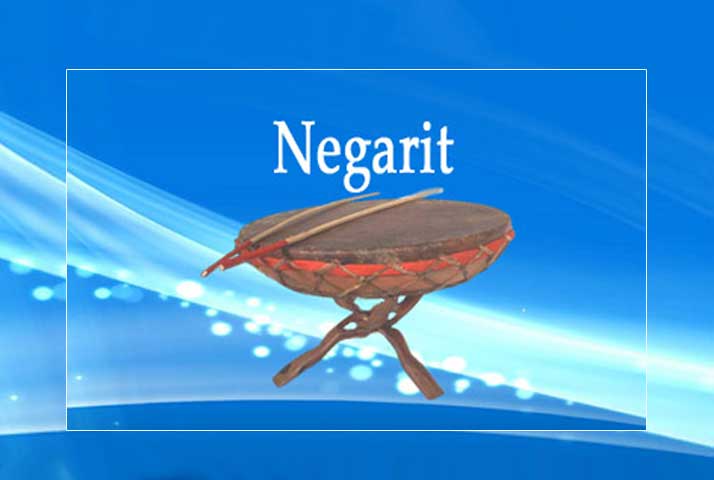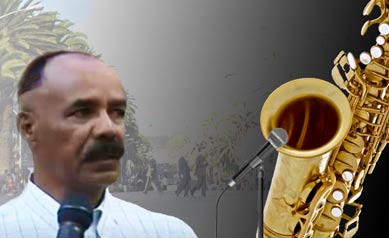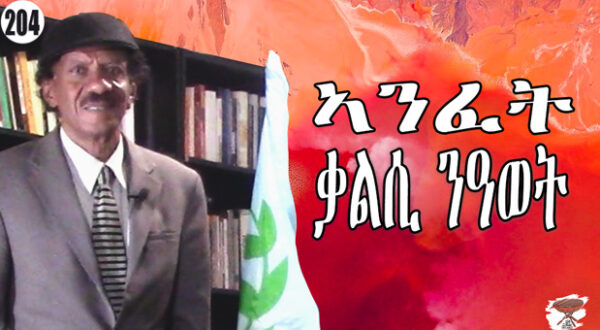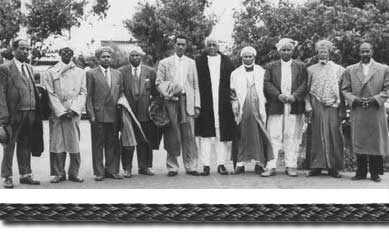Like An Aged Wine

In the last edition of Negarit, I promised to write about the issue of official languages in Eritrea. I have kept my promise. As usual, a short story will hopefully put you in a relaxed mood as you read this rather long article.
A drunken violinist, a Wata, had an excellent day in Asmara and was returning to his village in the outskirts. On his way, he arrived at a roaring river, which he could not cross. Since the main job description of a Wata is showering everyone with praise songs, he pleaded to the graceful river to slow down and enable him to cross to the opposite bank. He sang: Oh dear mighty river, my honorable river, please be gracious, slow down for a while and allow me to cross! The river didn’t yield. Another stranded man noticed the Wata singing to the river and told him: “the portion that you praised moves on and a new portion follows it; you have to focus on one portion and run alongside it until it is stops for you to cross!”
New opponents of the Arabic language keep appearing; it seems it is the fate of some of us to keep repeating the same argument ad nauseum. Like the violinist, we are doomed to repeat the same argument to new portions of the flood.
It would be nice to have a template with an FAQ that all newcomers to the debate would consult. They would at least be equipped with basic knowledge of the subject before they thrust themselves into the debate pretending to have something original to say. So far, most of the arguments are recycled to the extent that at times the topic becomes tiresome and exhausting. I also have to recycle; today I am resorting to old debate materials from 1997; you will find lengthy quotes from that year. By the time you finish reading, you will definitely understand why I think the language debate is exhausting.
A few stubborn individuals have turned our nation into one that wishes for unity without reconciliation; and a nation that pursues reconciliation without debating the issues that should be reconciled first. We have very loud individuals who call for national unity without attempting to remove the hindrances to it. If ignoring problems would solve them, cancer patients would have ignored their disease to total cure.
Avoiding Polarization
Almost a thousand years ago, the famous Persian thinker AlGhazali lamented the disunity of his compatriots and said, “Muslims are so good at dividing that they can divide the atom.” He had no idea Iran would attempt to go nuclear ten-centuries later. But it is another quote by AlGhazali that I found fitting to the situation of Eritreans. I took the liberty of rephrasing it: “If you see two Eritrean cadres, probably they belong to three parties.” Indeed, the language debate is polarizing; but it shouldn’t have been so.
Arguments to negate the status of Arabic in Eritrea did not change in substance, nor did the issue disappear. It will never disappear—how would it when it affects the lives of millions? Sadly, individuals who wave a paper with a long list of taboos have hindered fruitful debates. They think any talk about official languages will undo the Eritrea unity.
Over a decade ago, like now, there were individuals who claimed the topic is polarizing and it should be discouraged—they fail to notice that their patronizing posture is the only polarizing factor. Others, however, persistently objected. Here is a sample-view that believed in taboo busting:
“The only way to fight polarization … is to engage and bring about consensus. Are we that fragile that we have to avoid ‘sensitive’ subjects? … Is superficial unity and harmony more important, than true democratic dialogue?” Gebru, Dehai, April 1, 1997
It is in the above spirit that I debated the issue; this edition of Negarit is not different.
Many fail to remember that Eritreans launched an armed struggle to reinstate the official languages, flag and other symbols of Eritrean sovereignty that Ethiopia violated—the violation of Arabic was one of the main reasons. No sane person should ignore the choice of half the population; and no one has the right to make a choice on their behalf—paternalist posture is anti-democratic and every bleeding-heart democrat should be aware of this fact. In a free country, citizens are equal and they have equal choices.
No one can beat the eloquence of the following quote that explains the right to make a choice:
“When you go to a restaurant with friends, do you order for them or [do you] tell them what they ordered was wrong and tell them to change it, or [do you] pester them about their choice?” Senai Asefaw, Dehai, April 13, 1997
A Tigrinya saying goes: ab mkbbar kullna goita, ab mtHssar kullna anta—‘In mutual respect we are all lords; in mutual disrespect we are all degraded.’
The elite of the society has always been in the middle of all political and social unrest in Eritrea. Today’s unelected rulers of Eritrea have been perpetuating the prejudices and paternal attitudes of the past for too long. We need to ask ourselves some serious questions: What emboldens the rulers to continue to punish the people with impunity? Why are Eritrean citizens so weakened that they cannot resist tyranny? I am sure an honest answer to these questions would clear a lot of confusion and would strengthen mutual trust among Eritreans and enable them to wage an effective combined national struggle. However, that would be possible only when those who declare their commitment to justice and democracy refrain from trivializing the destructive issues that disrupt social harmony and perpetuate social inequality.
What Is In Arabic?
If anyone doubts that the Eritrean language policy is conceived, implemented and perpetuated based on the regime’s crooked intentions, here is glaring evidence: the regime identifies the so-called Eritrean ethnic groups based on their language: Tigre, Kunama, Tigrinya, etc. But there is one exception: Why are the Rashaida not called Arabs based on their language? Didn’t the regime baptize the rest of the ethnic groups based on the language they speak?
The intensity of the regime’s obsession with systematically excluding Arabic from Eritrea is in direct contrast to the intensity with which Eritreans are determined to defend their choice. Still, the irresponsible rulers keep pursuing their destructive projects.
The situation gets worse because of the wrong perception of some Eritreans who think Arabic is alien to Eritrea. They should have known that modern education started in Eritrea about a century ago; Eritreans have been around in that land quite a few centuries before that. Traditionally, children gained basic education in two ancient social institutions: the church, where they memorized the gospels and the Khelwa (which incidentally is called Medressa) where they learned the Koran. In both places, they learned to read, write and gained basic skill in arithmetic. For a millennia, while Christians learned in Geez (and in modern times in Tigrinya), Muslims learned in Arabic for as long as they can remember. That should establish the fact that Arabic, (since no one is objecting to Tigrinya) has been an indigenous Eritrean language forever. It is that knowledge that helped the founding fathers of Eritrea to agree and designate Arabic and Tigrinya as official languages of the nation. That treaty is sacrosanct—any violation of that agreement bears grave consequences, something those with an arrogant posture refuse to realize.
Sometimes, arguments about languages in the Eritrean context have appeared as politically correct views; other times, they appeared as rude and as an outright falsification of history that ignored facts—or “facts on the ground”, as the Eritrean ruler would say. They air those views with an intention to exclude Arabic from Eritrea; it’s an approach piloted by the regime.
In the nineties, the constitution commission of Eritrea toured the world to promote the idea of adopting mother languages (never mind they had already decided that.) I attended a meeting called by Mussa Naib whose defence of the mother-tongue policy was more of an attack on Arabic as evidenced by his attempts to coerce people into erasing their memories. Mussa stated that the British introduced Arabic to Eritrea; he didn’t blink when he said that! Neither did he appear willing to reconsider his assertion that he certainly knew to be false. Someone asked a question: “In what language did your ancestors the Naibs of Massawa correspond and in what language did they gain their primary education?” Of course, Mussa brushed the questions off.
To successive generation of Eritrean Muslims, Arabic has been in the centre of their lives: a ceremonial language when their children are born, when they get married and when they die. They have been writing their will, marriage and business contracts and communications in Arabic. It serves as the storage of their heritage and culture; and it is one of the pillars of Eritrea. (Please note that I do not wish to debate the religious and racial aspects of Arabic this edition that is already getting longer than I intended it to be.)
While Mussa Naib and other Isaias apparatchiks aggressively promoted the regime’s anti-Arabic agenda, chunks of naïve Eritreans enjoyed the state of denial. By not raising the red flag, they have collaborated in one way or another, though not all are malicious. It is evident that many members of the constitution commission either did not know the Eritrean society to act justly, or knew it but they reinforce the regime’s policies under coercion. A few like Mussa were willing and conscious collaborators. To make it worse, there were innocent and genuine individuals who supported the regime’s language policy simply because they subscribed to the UNESCO doctrine.
The UNESCO Doctrine
I am not sure how UNESCO describes its goals and missions, but in the Eritrean context, in relation to the mother-tongue policy, I am taking the liberty to define it as follows: a doctrine that fiercely promotes the equality of languages. It promotes mother tongues as both a governing policy and as a means of education. Unwavering believers defend the doctrine as any fanatic would defend his faith.
How many times did you hear or read arguments related to official language? I have lost count; there is no way one would be able to tell the number of articles written, speeches delivered and arguments made—it has been going on since the 1940s. Over time, the now deformed debate, centered on the Arabic language, has become stale and boring. One side continuously pleaded and urged everyone to be understanding. The other side always resorted to condescending posture and refusing to understand. A third group belongs to neither: it is composed of mostly genuinely concerned persons, leftists of the types who embrace the UNESCO doctrine. The following explains the genuine (but wrong) side of the leftist view:
“One cannot give a constitutional imprimatur to one or two of the local languages, without downgrading the other eight or seven. We are a multilingual society. The moment we designate, constitutionally, some, and not all, of our languages, we will surely be straying from the equality provision–the cornerstone-of our constitution. This we cannot do, must not do.” Tekie Fesahatzion, Dehai, April 14, 1997
I hope the able leftists recognize the damage they did by unconsciously promoting such a destructive policy. One would hope that they come out and help in correcting the mistakes; I am sure they lack neither the courage nor the wisdom to realize that the situation needs their input.
After eighteen years of misrule in Eritrea, we all know the language issue is not theoretical any more. The UNESCO doctrine is just another useless acrobatics. We can declare with certainty that the mother tongue policy has damaged the development of Eritreans. Available data (and experience) refutes the leftist argument and exposes its weakness.Ahmad Raji’s Rainbow series (Part 1: Aug 9; Part 2: Aug. 15; Part 3: Aug. 24; and Part 4: Oct. 1) dealt fatal blows to any argument that downplays the damage caused by the regime’s unjust policies.
Idris Aba-Arre Paid His life
Not many mention the courageous Idris Aba-Arre who warned about the risks of the irresponsible and mischievous language policy. In 2001, the regime threw him in jail for his views and he disappeared in the dungeons of the clique. Aba-Arre challenged the elite that should have known better, that exclusion of Arabic is detrimental to the cohesion of Eritreans and vital to social justice. They didn’t heed his advice. Just as he predicted, almost twenty years of mischievous application of the mother-tongue policy produced two generation of illiterate adults (about 8% high school attendance.) The policy also effectively barred those whose educational background is Arabic from employment in the public sector. Furthermore, it exposed the regime’s unwillingness (and inability) to provide translation services for citizens who speak in one of the theoretically equal mother-tongue languages.
Unfortunately, to those bent on fighting Arabic, no argument proves acceptable. Abundant condescending remarks still pop up. Check a sample from 1997:
Dear Saleh Gadi,
“I have read each and every argument you put forward to justify Arabic fanaticism. Your thesis is clear and simple. You feel more closely-related to the Arabs than to your biological brothers and sisters (non-moslem Eritreans in particular). Have you or will you ever protect Eritrean nationalism before anything else? May be not. To you and many others, Islam comes first before Eritrea. That’s why many of you supported Yemen. If you are one of them, I don’t care what you think because I don’t see you as an Eritrean. I grew up with Moslems and still cherish their love and friendship. That is what matters.”Kuflom, April 24, 1997
English for Official Language
At first sight, the proposal to adopt English as an official language seems reasonable and enlightened. But we should take note: they always float such ideas as a remedy to the perceived problems associated with Arabic. It proves how as a society we have not progressed at all—we are still trying to “reinvent the wheel.” English does not have the ability to provide the emotional and spiritual needs that only indigenous languages could offer.
Programmers choose computer languages for robots; and the robots would not object if the programmer installed in them different language software. But societies have cultures and traditions. Tampering with established norms comes at the expense of the much-needed social balance, and at the expense of established languages, resulting in great damages. Still, the UNESCO doctrine must be encouraged to flourish, but if it does not fit a situation, it should not be forced to it. Presenters should first remember to respect the choice of the people before floating their proposals. Societies strive to preserve their economic, political and social interests by making pertinent choices. Academic acrobatics and proclamations are not a means of dropping a society’s heritage.
The above argument does not mean cultures and languages are stagnant, they evolve and change. But evolution should be natural not one steered by ideologues bent on social engineering who intend to disrupt the lives of the people.
The proposal to adopt English as an official language could also be misleading. We know that the Ethiopian occupation’s educational system was based on English as a language of post-elementary school education. But the importance of languages should not be seen in isolation to culture and emotions.
The situation has become more painful because prejudiced, bigoted elements and an outlaw regime control the fate of the nation. Only empowered citizens would reasonably solve such seemingly complicated issues; they did it in the fifties and they can do it in the future. And there are multitudes of issues waiting to be solved by representatives elected by free citizens. Even then, hiring and firing of civil servants should not be left to bigoted individuals.
I personally would not have a problem if the people chose, say, Amharic as an official language—they might argue that Ethiopians had occupied Eritrea for decades and that Amharic is widely accepted. I don’t think many would go against a popular will. But one does not have to prove the obvious; I do not think Eritreans would ever consider that, neither would they consider English. Therefore, the proposal is simply moot.
No. I am not an Arab.
For the sanity of the nation, I hope that most anti-Arabic individuals realize that no one is asking for their permission, alms or a goodwill gesture. They should stop their patronizing attitudes: “you lack self-confidence; you betray your own language; and, you want to sell Eritrea to the Arabs.” Importantly, they should stop repeating the notorious Isaias-blubber: do you speak Arabic at home?
I cannot become an Arab even if I wanted to because I am born a Habesha (not Tigrinya mind you.) Arabic is my heritage and it was never considered an alien language by either my parents, grandparents or any of my ancestors. My father was born before Mussa Naib’s British came to Eritrea. He memorized the Koran, learned how to read and write in a Khelwa, a Medressa, all in Arabic just like his ancestors. Of course, that was before criminalization of the word “Medressa.”
For years, uninformed TV hotheads in the West have been pronouncing Medressa with a chuckle: Obama went to a Medressa, oooh, aaah! Many of us laughed in sadness for the rampant ignorance. There is hardly a Muslim, the world over, who didn’t go to a Medressa. Not only in Arabic, but also in many languages including Tigre, the word for school is Medressa. It is sad and painful to see some Eritreans considering Medressa to be a bad word; many have been gleefully using the word in their hate mails and in discussion forums only to expose their ignorance of the Eritrean culture. They seal their ignorance with a slogan: Had Hzbi Hade Lbi. Rumor has it that the proverbial Adey Halima distributed Mushabekh during Ramadan; it seems none of her children went to a Medressa!
Aged like Wine
Finally, I would like to end this edition by addressing one of the most legitimate concerns that I heard: the fear of a sector of Eritrea from being overwhelmed by Pan-Arabism.
Never mind that wine, new or aged smells like a public urinal, at least to me. But since they say aged wine is excellent, I am hoping the following aged argument would contribute a little in addressing the fear. This quote is straight from the Cellar:
“Pan-Arab-Nationalism
Some people are concerned that Arabic might be used as a vehicle to promote Pan-Arab nationalism. They are also worried by “Arab Imperialism.” But if Arabic is considered a vehicle, that vehicle has unloaded its cargo and has been on Eritrean roads since a long time ago. It carries an Eritrean registration plate. Can Tigrinya be a threat to Eritrea? Is there something called Tigrinya Imperialism?
Arab Nationalism is a Scarecrow that time has taken its’ toll on. It is already falling apart everywhere. The sort of Pan-Arab nationalism that frightens some people is dead and buried. The dream has evaporated with the death of its’ last champions, Jemal Abdul Nasser. Arab thinkers had dreamed of reviving the Arab glory of the middle ages. Arab intelligentsia awakened after the collapse of the Ottoman Empire followed by European colonialism. The ideology is a natural product of an age when Arabs were being haunted by their glorious past that they yearned to revive.
At a later stage, Michelle Aflaq, an Arab Christian philosopher, come up with the Ba’athist doctrine. He formulated Arab Nationalism in a socialist mold. Again, he was influenced by the sweeping wave of Marxism and Leninism.
In the Arab world, Muslim radicals accuse Pan-Arabists of being instruments of the Marxists and disguised enemies.
Azmi Bushara is an Arab, a Palestinian and an Israeli at the same time. Though he carries three different (and presumably contradicting) identities, he used to be a member of the Israeli Parliament. To understand Arab nationalism, I recommend you read for Iliya Hariq of Indiana University.
The Arab Intelligentsia’s dream of establishing one large Arab world—even if loosely confederated—has been shattered in their faces. They have awakened to the fact that they have to respect the individual sovereignty of Arab states and their citizens. They have understood that the interest of one Arab state can be different to a neighboring Arab state and at the same time be similar to the interest of a non–Arab state.
This was evident in the Gulf war of 1990. Kuwaiti interests come closer to American interests than they were to Pan-Arabist Iraq’s interests. Several examples can be cited: the clash of interest between Algeria and Morocco over the Western Sahara; Egyptian and Sudanese interests in Hala’yeb; border disputes between Saudi Arabia and both Qatar and Yemen.
There is no Pan Arab nationalism that should scare us. This is a propaganda tool dying out faster than one could imagine. The Arab intelligentsia is killing it. They had to face the harsh reality that there is no direct interest exclusive to, say Bahrain and Morocco. They are two different worlds. Even the Arabic language has evolved differently in the two countries. So has the interest of the two countries. Morocco is better off with its neighbors in Southern Europe and Bahrain is better off with Iran and India. This is evident from the way their economies function.” Saleh Gadi, Dehai, April 24, 1997
If you came this far, you have endured. You must have already discovered that the entire chapter in italics is recycled from 1997. I have considerably edited the piece for brevity, dated statements and redundancy.
It is interesting though: Twelve years later, the arguments have not changed one bit. Worse, despite the many debates, attempts to persuade and pleading for understanding have not changed the minds of many who still maintain patronizing attitudes—one would be tempted to pick a violin and sing, “PLEASE GIVE US A BREAK!”




Awate Forum